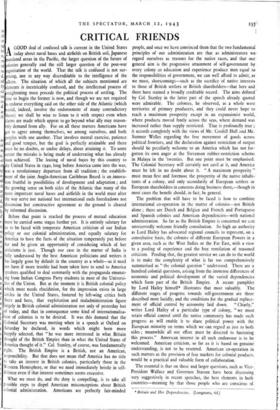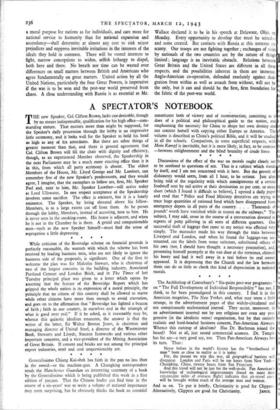CRITICAL FRIENDS GOOD deal of confused talk is current in
the United States today about naval bases and airfields on British soil, Japanese andated areas in the Pacific, the larger question of the future of olonies generally and the still larger question of the post-war iganisation -of the world. That the talk is confused is not sur- rising, nor in any way discreditable to the intelligence of the ers. The situation of which all the subjects mentioned are lements is inextricably confused, and the intellectual process of traightening must precede the political process of settling. The .me to begin the former is now, and though we are not required or 0 endorse everything said on the other side of the Atlantic (which ould, indeed, involve the endorsement of many contradictory eses) we shall be wise to listen to it with respect even when laims are made which appear to go beyond what ally may reason- bly demand from ally. For on all these matters Americans have at to agree among themselves, we among ourselves, and both copies with one another. That involves mental exercise, patience d good temper, but the goal is perfectly attainable and there ust be no doubts, or undue delays, about attaining it. To some xtent the mistake is being made of underrating what has already been achieved. The leasing of naval bases by this country to e United States in 1940, long before America came into the war, q 'as a revolutionary departure from all tradition ; the establish- eat of the joint Anglo-American Caribbean Board is an innova- 'on fruitful in possibilities of development and adaptation ; and he growing sense on both sides of the Atlantic that many of the ore important naval bases and airfields in the world must after e war sate not national but international ends foreshadows not issension but constructive agreement as the ground' is cleared by informed discussion.
Before that point is reached the process of mutual education must be carried some stages further yet. It is entirely salutary for us to be faced with temperate American criticism of our Indian )e policy or our colonial administration, and equally salutary for America to have the facts of the situation temperately put before her and be given an opportunity of considering which of her criticisms is just. Though our case in the matter of India is fully understood by the best American politicians and writers it has largely gone by default in the country as a whole—as it need not have if more trouble had been taken here to send to America speakers qualified to deal summarily with the propaganda emanat- ing from Indian Congress Party students in most of the Universi- ties of the Union. But at the moment it is British colonial policy which most needs elucidation, for the impression exists in large circles in the United States, fostered by left-wing critics both there and here, that exploitation and maladministration figure largely in British colonial administration not only of yesterday but of today, and that in consequence some kind of internationalisa- tion of colonies is to be desired. It was this demand that the Colonial Secretary was meeting when in a speech at Oxford on Saturday he declared, in words which might been more happily selected, that "he was more interested in what Britain thought of the British Empire than in what the United States of America thought of it." Col. Stanley, of course, was fundamentally right. The British Empire is a British, not an American, responsibility. But that does not mean thaT America has no title to take an interest in British colonies, particularly those in the , Western Hemisphere, or that we need immediately bristle in self- defence even if that interest sometimes seems excessive.
What we must do, and the duty is compelling, is to take all ossible steps to dispel American misconceptions about British colonial administration. Americans are perfectly fair-minded people, and once we have convinced them that the two fundamental principles of our administration are that as administrators we regard ourselves as trustees for the native races, and that our general aim is the progressive attainment of self-government by every colony as education and experience produce men equal to the responsibilities of government, we can well afford to admit, as we must, shortcomings—such as the sacrifice of native interests . to those of British settlers or British shareholders—that here and there have stained a broadly creditable record. The aims defined' by Col. Stanley in the latter part of the speech already quoted were admirable. The colonies, he observed, as a whole were territories of primary producers, and they could never hope to reach a maximum prosperity except in an expansionist world, where products moved freely across the seas, where demand was increased rather than supply restricted. That is profoundly true ; it accords completely with the views of Mr. Cordell Hull and Mr. Sumner Welles regarding the free movement of goods across political frontiers, and the declaration against restriction of output should be peculiarly welcome to an America which has not for- gotten its own anger at the Stevenson rubber-restriction scheme in Malaya in the 'twenties. But one point must be emphasised. The Colonial Secretary will certainly not cavil at it, and America must be left in no doubt about it. "A maximum prosperity "' must mean first and foremost the prosperity of the native inhabi- tants of a colony, and only secondarily of European settlers or European shareholders in concerns doing business there,—though in most cases the benefit should, in fact, be general.
The problem that will have to be faced is how to combine international co-operation in the matter of colonies—not British alone ; there are Dutch and Belgian and French and Portuguese and Spanish colonies and American dependencies—with national administration. So far as the British Empire is concerned we can unreservedly welcome friendly consultation. So high an authority as Lord Hailey has advocated regional councils to represent, on a consultative basis, the colonies of different European Powers in a given area, such as the West Indies or the Far East, with a view to a pooling of experience and the free ventilation of reasoned criticism. Pending that, the greatest service we can do to the world is to make the complexity of what is far too comprehensively summarised as "the colonial question" understood. There are a hundred colonial questions, arising from the immense differences of economic and political development of the varied dependencies which form part of the British Empire. A recent pamphlet by Lord Hailey himself* illustrates that most valuably. The different stages of progress towards self-government are there described most lucidly, and the conditions for the gradual replace- ment of official control by autonomy laid down. "Clearly," writes Lord- Hailey of a particular type of colony, "we must retain official control until the native community has made such progress as will enable it to share political power with the European minority on terms which we can regard as just to both sides ; meanwhile all our effort must be directed to hastening this process." American interest in all such endeavour is to be welcomed. American criticism, so far as it is based on genuine understanding, is not to be resented. American co-operation in such matters as the provision of free markets for colonial products would be a practical and valuable form of collaboration.
The essential is that on these and larger questions, such as Vice- President Wallace and Governor Stassen have been discussing very suggestively in recent speeches, the best elements in both countries—meaning by that those people who are conscious of.
* Britain and Her Dependencies. (Longmans, 6d.) a moral purpose for nations as for individuals, and care more for national service to humanity than for national expansion and ascendancy—shall determine at almost any cost to sink minor prejudices and suppress inevitable irritations in the interests of the ideals they hold in common. There will be vested interests to fight, narrow conceptions to widen, selfish lethargy to dispel, both here and there. No breath nor time can be wasted over differences on small matters between British and Americans who agree fundamentally on great matters. United action by all the United Nations, particularly the four Great Powers, is imperative if the war is to be won and the post-war world preserved from chaos. A close understanding with Russia is as essential as Mr. Wallace declared it to be in his speech at Delaware, Ohio, on Monday. Every opportunity to develop that must be seized— and some created. But contacts with Russia at this moment are scanty. Our troops are not fighting together ; exchanges of visits by nationals of the two countries are by the nature of things limited ; language is an inevitable obstacle. Relations between Great Britain and the United States are different in all these respects, and the possibilities inherent in them are immense. Anglo-American co-operation, defended resolutely against deni- gration from within as well as assault from without, will not be the only, but it can and should be the first, firm foundation for the fabric of the post-war world.



























 Previous page
Previous page